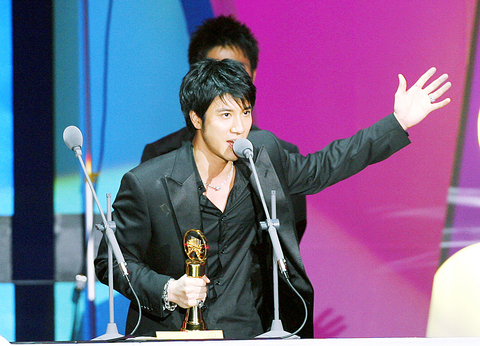There were high expectations for altnative music at last night's Golden Melody Awards, but with Wang Lee-hom (
In a drawn out ceremony last night, Taiwan's music industry gave out awards for its high achievers in the 17th Golden Melody Awards (十七屆金曲獎), which took place at Taipei Arena, Taipei (台北巨蛋). Thousands of fans crowded outside the stadium to get a sight of their favorite stars.
On the red carpet, Little S (小S) and Momoko Tao (陶子), the hosts for the night, enlivened proceedings by spraying "milk" from their breasts into the crowd. This little performance follows months of media reports about the birth of their baby girls and whether they would be back in shape for this glamorous event. Little S looked fine, but Tao clearly still has some way to go before achieving her previous slim shape.

This rather gross display was followed in the award ceremony by some poorly rehearsed performances by Stefanie Sun and Hong Kong pop star Eason Chan (
Taike promoters Chang Chen-yue (
Some familiar faces were missing from the nomination list, and last night's event featured an unusually large number of stars drawn from Taiwan's alt-music scene. While folk and folk-rock have always had a presence at the Golden Melody Awards, their prominence this year has been underlined by the inclusion of Puyuma folksinger and activist Kimbo, also known as Hu De-fu (

PHOTOS: TAIPEI TIMES
This year, awards were presented in 31 categories, with nominees selected by a 33-member panel of judges from a staggering 6,884 entries.
Kimbo had picked up the award for Best Lyricist and Best Song, which many people thought was long-overdue recognition of his contribution to music in Taiwan.
Kimbo's first album In a Flash, a retrospective record looking back at the legendary Aboriginal crooner's 30-year musical career from 1972 to 2001, was a talking point in the run up to the event. He is best known for his vocal prowess and his poetic folk music full of social

commentaries. Kimbo has also been an activist in Taiwan's social, political and Aboriginal movements and was blacklisted by the Chinese Nationalist Party (KMT) government in the late 1970s and early 1980s for his outspoken dissident voice.
Another veteran of the music scene Lin Jia-qing (
As many expected, Wu Bai (
Penny Tai (戴佩妮) took one of the first pop musical awards for best composer for Crazy Love. Speaking backstage after receiving the honor, Tai said she was shocked by the totally unexpected recognition. "I am a self-taught composer who has little talent in song-writing, and I never thought that my songs would get spread outside my room. Crazy Love is a very personal song, and at first I didn't even want to have it released," the misty-eyed songstress said in a humble tone.
The highlight of last night's event came when award presenters Wu Bai and Gigi Leung (
The Best Band category saw the emergence of underground and alternative acts such as the Hohak Band (
With little surprise, the better known Chairman (董事長) took the award for best band, squeezing out other nominees Nature Q, Sodagreen, Won Fu, LTK Commune and Hohak Band, which was awarded the Best Hakka Album award for Hohak Carnival.
The absence of heavyweight teen idols such as the Double J pair Jay Chou (周杰倫) and Jolin Tsai (蔡依林) and the dominant presence of Kimbo had generated considerable speculation about a shift in the Golden Melody Awards from big-ticket pop acts to smaller and more intimate singer/song writers. But in fact Penny Tai, Cheer Chen and songstress Tanya Tsai (蔡健雅), who were all nominated for Best Mandarin Female Singer this year are no strangers to the Golden Melodies, and Jolin Tsai has never been a jury favorite. A bias toward the alternative scene announced itself back in 2000 with Faith Yang (楊乃文) beating out Faye Wang (王菲) and A-mei (張惠妹) to walk away with Best Mandarin Female Singer title.
More recently, last year's award ceremony saw the alt-music songstress Sandy Chen (陳珊妮) take top honors in Best Album and Best Producer categories whereas the favorite Golden Melody winner Jay Chou walked away empty handed despite nominations in six categories.
Hakka and Aboriginal sounds have also risen to prominence at the Golden Melody in recent years. Last year Hakka band Sheng Xiang and Water 3 (生祥與瓦窯3) had seven nominations, winning Best Lyricist, Best Hakka Album and Best Band. Beinan musician Chen Chian-nien (陳建年) also took the best male singer title away from other high-profile contenders such as Wang Lee-hom (王力宏) and Jackie Cheung (張學友).

As Taiwan’s second most populous city, Taichung looms large in the electoral map. Taiwanese political commentators describe it — along with neighboring Changhua County — as Taiwan’s “swing states” (搖擺州), which is a curious direct borrowing from American election terminology. In the early post-Martial Law era, Taichung was referred to as a “desert of democracy” because while the Democratic Progressive Party (DPP) was winning elections in the north and south, Taichung remained staunchly loyal to the Chinese Nationalist Party (KMT). That changed over time, but in both Changhua and Taichung, the DPP still suffers from a “one-term curse,” with the

William Liu (劉家君) moved to Kaohsiung from Nantou to live with his boyfriend Reg Hong (洪嘉佑). “In Nantou, people do not support gay rights at all and never even talk about it. Living here made me optimistic and made me realize how much I can express myself,” Liu tells the Taipei Times. Hong and his friend Cony Hsieh (謝昀希) are both active in several LGBT groups and organizations in Kaohsiung. They were among the people behind the city’s 16th Pride event in November last year, which gathered over 35,000 people. Along with others, they clearly see Kaohsiung as the nexus of LGBT rights.

Jan. 26 to Feb. 1 Nearly 90 years after it was last recorded, the Basay language was taught in a classroom for the first time in September last year. Over the following three months, students learned its sounds along with the customs and folktales of the Ketagalan people, who once spoke it across northern Taiwan. Although each Ketagalan settlement had its own language, Basay functioned as a common trade language. By the late 19th century, it had largely fallen out of daily use as speakers shifted to Hoklo (commonly known as Taiwanese), surviving only in fragments remembered by the elderly. In

In the American west, “it is said, water flows upwards towards money,” wrote Marc Reisner in one of the most compelling books on public policy ever written, Cadillac Desert. As Americans failed to overcome the West’s water scarcity with hard work and private capital, the Federal government came to the rescue. As Reisner describes: “the American West quietly became the first and most durable example of the modern welfare state.” In Taiwan, the money toward which water flows upwards is the high tech industry, particularly the chip powerhouse Taiwan Semiconductor Manufacturing Co (TSMC, 台積電). Typically articles on TSMC’s water demand